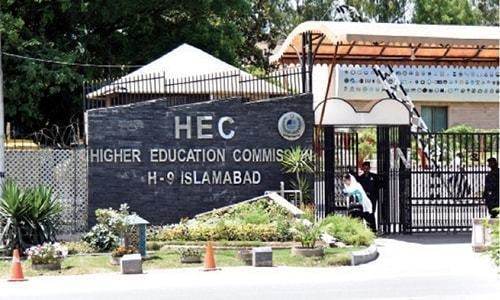Dysfunctionalities Of HEC And The Way Forward
Pakistan Institute of Development Economics (PIDE) hosted a webinar on “HEC Travails” on 26th May with a very intellectual and experienced panel to discuss the Higher Education System in Pakistan.
There are various issues raised about the bureaucratic structure and the wasted interests inside the HEC and its linkages with the universities. The standards are set at a very low level because of government interference. The culture and notion of education in Pakistan has been declining over the past two decades. The fund’s allocation in the HEC is without any formula and has encouraged the wasted-interest groups to utilize the money in the wrong direction.
In 2002, HEC had started a program of “Rewards” which leads to major destructions in the education system of Pakistan. The incompetent inductions in the faculty have tremendously shown a decline in the standards of educational performance. The promotional standards set about producing PhDs and publication of research papers have spread a disease of writing research papers and its publication across the country with zero output. These problems arose the skill and knowledge deficit with producing incompetent graduates to the market and a standard of fake degrees. Because the worth of a degree is to be known by the quality of knowledge and skills of a graduate.
The lack of autonomy in the universities leads to the interference and personal gains of third parties and a gateway to the incompetent faculty and administrators. The regulatory bodies’ organogram is full of incompetent chairs which leads to wasted interests.
The dysfunctionalities in the HEC arose major issues and problems in the functionalities of universities in Pakistan. The political interests and government influence has increased the numbers of new universities in the past two decades. Resultantly, this has disrupted the admission criteria of the entrance to an undergraduate degree. The number of graduates in the market is higher than the number of available opportunities leads to unemployment and is showing the low standard quality assurance structured by the HEC.
Before the HEC was established there were a total of 20-30 universities in Pakistan. Currently, in Pakistan, there are 250 universities, 139 universities are in the public sector and 46 universities in the private sector. The dilemma of building new universities from the past two decades to the micro-level based on region and district level-based universities is making a collapse in the standards of faculty.
Moreover, the standards of establishing new universities with the objective of utilizing funds and rather improving the quality and innovation in the established institution have declined the performance of faculties and the output in producing the quality graduates. Alternatively, the fund could possibly be used in improving the research standards of mature universities.
Higher Education Commission of Pakistan is interfering in internal university affairs. With a greater influence of hiring faculties in particular and staff in general. The Senate and Syndicate of universities comprise of Secretaries, government officials, bureaucrats rather the technocrats and highly qualified and experienced academicians. The over-regulatory policies and interference in internal affairs withdraw the standard objectives set by the universities.
Way Forward
Globally, universities are self-regulatory and governance institutions. Likewise, in the United States, the Senate deals with academic matters and the Board of Governance deals with external matters. Pakistan has to adopt the approach and refine the objectives of HEC in a supportive manner rather be the centralized regulatory body. To give autonomy to HEC as a supportive entity and decentralize the power structure of HEC and universities to avoid government interference in the committees like Senate and Syndicate. In the US there is no HEC but an organization of the ‘Association of American Universities’ has set the standards and framework for the smooth functions of university administration and producing quality graduates. Such, framework of a decentralized system is needed in Pakistan to avoid the allocation of funds and the hiring of faculty in the wasted interests. And the promotion based on the publication of research papers is to be reformed with the induction of direct BPS positions or performance-based promotions to question the quality of research rather than the numbers of research papers. The payment to supervisors shall be stopped and be counted in the services like in the US they don’t pay for this specific job.
Globally, universities work in two different ways; undergraduate studies and Research. Sadly, in Pakistan, we have mixed up these two major objectives with including both the undergraduate studies and the research in one entity.
The only mature institution can do quality research at the graduate level and produce good doctorate graduates but the newly established universities have declined the values of Pakistan PhDs and research.
We need to focus on the quality of undergraduate education which leads to producing quality Scholars in our universities. Because the majority of evaluated PhD dissertations are not even equivalent for awarding degrees.
Attestation of degrees protocol doesn’t count any objective but rather a waste of time and money for graduates. Some might feel it’s a disgrace for them for getting degrees from world prestigious universities like Harvard and MIT.
The Parliament doesn’t value education and the Prime Minister is dis-informed by the people around him and the ministers don’t have expertise in education. We really need a dedicated Prime Minister to value education and protect the rights of citizens, the students, parents, and society.
Policy Recommendations
The key policy recommendations for enhancing the HEC role is to refine their objectives for quality education which includes;
1. HEC shall play the role of supporting institution rather than a centralized regulatory body.
2. The universities shall be autonomously appointing the members of the Senate and Syndicate committee for their internal matters.
3. Allocation of funds for building new universities shall be utilized in bringing innovation in the mature universities.
4. HEC shall do an annual evaluation of universities to ensure quality.
5. Promotion based on research papers and producing PhDs shall be avoided. Universities shall be autonomous in this decision.
6. A needed focus on undergraduate studies on a priority basis is needed.
7. Attestation shall be stopped for national and foreign universities.
Note: Originally the article is published in Naya Daur.
Please share your feedback in the comments.












well written ..